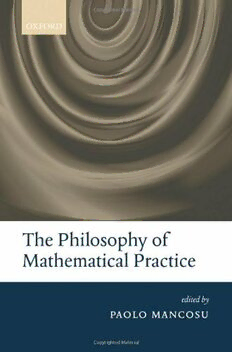Download The Philosophy of Mathematical Practice PDF Free - Full Version
Download The Philosophy of Mathematical Practice by Paolo Mancosu (Editor) in PDF format completely FREE. No registration required, no payment needed. Get instant access to this valuable resource on PDFdrive.to!
About The Philosophy of Mathematical Practice
Contemporary philosophy of mathematics offers us an embarrassment of riches. Among the major areas of work one could list developments of the classical foundational programs, analytic approaches to epistemology and ontology of mathematics, and developments at the intersection of history and philosophy of mathematics. But anyone familiar with contemporary philosophy of mathematics will be aware of the need for new approaches that pay closer attention to mathematical practice. This book is the first attempt to give a coherent and unified presentation of this new wave of work in philosophy of mathematics. The new approach is innovative at least in two ways. First, it holds that there are important novel characteristics of contemporary mathematics that are just as worthy of philosophical attention as the distinction between constructive and non-constructive mathematics at the time of the foundational debates. Secondly, it holds that many topics which escape purely formal logical treatment--such as visualization, explanation, and understanding--can nonetheless be subjected to philosophical analysis. The Philosophy of Mathematical Practice comprises an introduction by the editor and eight chapters written by some of the leading scholars in the field. Each chapter consists of a short introduction to the general topic of the chapter followed by a longer research article in the area. The eight topics selected represent a broad spectrum of contemporary philosophical reflection on different aspects of mathematical practice: diagrammatic reasoning and representational systems; visualization; mathematical explanation; purity of methods; mathematical concepts; the philosophical relevance of category theory; philosophical aspects of computer science in mathematics; the philosophical impact of recent developments in mathematical physics.
Detailed Information
| Author: | Paolo Mancosu (Editor) |
|---|---|
| Publication Year: | 2008 |
| ISBN: | 9780199296453 |
| Pages: | 461 |
| Language: | English |
| File Size: | 1.529 |
| Format: | |
| Price: | FREE |
Safe & Secure Download - No registration required
Why Choose PDFdrive for Your Free The Philosophy of Mathematical Practice Download?
- 100% Free: No hidden fees or subscriptions required for one book every day.
- No Registration: Immediate access is available without creating accounts for one book every day.
- Safe and Secure: Clean downloads without malware or viruses
- Multiple Formats: PDF, MOBI, Mpub,... optimized for all devices
- Educational Resource: Supporting knowledge sharing and learning
Frequently Asked Questions
Is it really free to download The Philosophy of Mathematical Practice PDF?
Yes, on https://PDFdrive.to you can download The Philosophy of Mathematical Practice by Paolo Mancosu (Editor) completely free. We don't require any payment, subscription, or registration to access this PDF file. For 3 books every day.
How can I read The Philosophy of Mathematical Practice on my mobile device?
After downloading The Philosophy of Mathematical Practice PDF, you can open it with any PDF reader app on your phone or tablet. We recommend using Adobe Acrobat Reader, Apple Books, or Google Play Books for the best reading experience.
Is this the full version of The Philosophy of Mathematical Practice?
Yes, this is the complete PDF version of The Philosophy of Mathematical Practice by Paolo Mancosu (Editor). You will be able to read the entire content as in the printed version without missing any pages.
Is it legal to download The Philosophy of Mathematical Practice PDF for free?
https://PDFdrive.to provides links to free educational resources available online. We do not store any files on our servers. Please be aware of copyright laws in your country before downloading.
The materials shared are intended for research, educational, and personal use in accordance with fair use principles.

